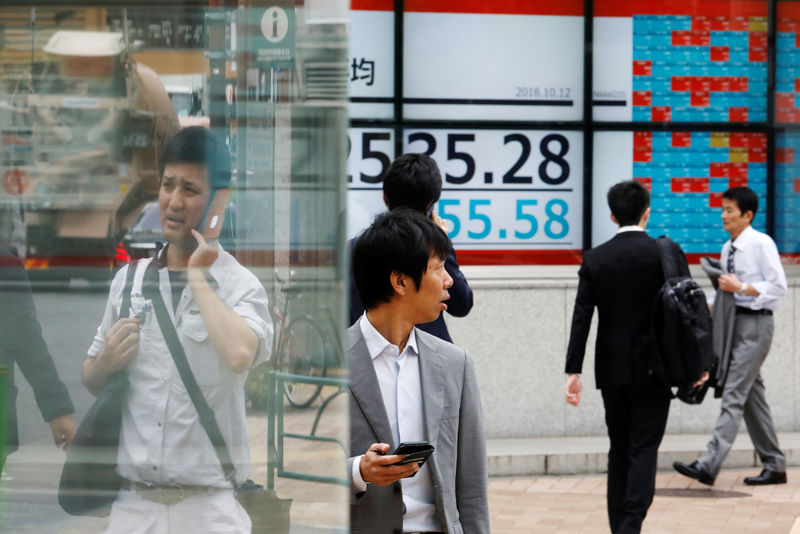By Hideyuki Sano and Daniel Leussink
TOKYO (Reuters) - U.S. stock futures and Asian shares slumped on Thursday after Canadian authorities arrested a top executive of Chinese tech giant Huawei for extradition to the United States, feeding fears of a fresh flare-up in tensions between the two superpowers.
The news came as Washington and Beijing are set to begin negotiations aimed at de-escalating their bruising trade war, which is adding to deepening worries over higher U.S. interest rates and other risks to global growth.
The sell-off looked set to extend into European trading, with spreadbetters expecting London's FTSE 100 (FTSE) to drop 0.9 percent at the open, Frankfurt's DAX (GDAXI) to lose 1.5 percent and Paris' CAC 40 (FCHI) to fall 1.4 percent.
S&P500 e-mini futures (ESc1) fell almost 2 percent at one point in thin Asian morning trade and were last were down 1.3 percent.
The losses in the first few minutes of trading might have been even steeper, but CME Group's Chicago Mercantile Exchange implemented a series of 10-second trading halts that helped limit the initial drop.
Japan's Nikkei (N225) shed 1.9 percent, closing at its lowest level since Oct. 30, with semi-conductor related shares leading the losses. Huawei is one of the world's largest makers of smartphones and telecommunications network equipment.
MSCI's ex-Japan Asia-Pacific index lost 2.0 percent (MIAPJ0000PUS). Hong Kong's Hang Seng (HSI) dropped 2.9 percent while Shanghai shares (SSEC) dipped 1.7 percent.
Canadian authorities said they had arrested Huawei's [HWT.UL] global chief financial officer in Vancouver, where she is facing extradition to the United States.
The arrest is related to violations of U.S. sanctions, a person familiar with the matter said, though officials have so far stayed mum on her allegations.
The arrest heightened the sense of a major collision between the world's two largest economic powers not just over tariffs but also over technological hegemony.
Britain's BT Group (L:BT) said it was removing Huawei's equipment from the core of its existing 3G and 4G mobile operations. Australia and New Zealand have also rejected Huawei's products.
"The U.S. has been telling its allies not to use Huawei products for security reasons and is likely to continue to put pressure on its allies," said Norihiro Fujito, chief investment strategist at Mitsubishi UFJ Morgan Stanley (NYSE:MS) Securities.
"So while there was a brief moment of optimism after the weekend U.S.-China talks but the reality is, it won't be that easy," he said.
Shares of China's second-largest telecom equipment maker ZTE Corp (HK:0763) (SZ:000063) sank 9.1 percent in Hong Kong and 6.5 percent in Shenzhen.
ZTE had to temporarily halt much of its business earlier this year after the U.S. imposed an export ban on the company related to it illegally shipping U.S.-origin goods to Iran and North Korea.
WORRIES ABOUT SLOWER U.S. GROWTH
Markets had initially brightened this week after U.S. and Chinese leaders agreed a temporary trade truce at a meeting on Saturday. But the mood quickly soured on scepticism that the two sides can reach a substantive deal on a host of hugely divisive issues within the tight 90-day time frame set out.
The benchmark Treasury 10-year yield (US10YT=RR) hit a three-month low of 2.874 percent, its lowest level since Sept. 7, before pulling up to 2.884 percent. U.S. markets were closed on Wednesday to mark the death of former President George H.W. Bush.
Adding to worries about U.S. recession risks, the yield curve remained inverted between two- and five-year zones, with five-year notes yielding 2.763 percent (US5YT=RR), below 2.778 percent on two-year notes (US2YT=RR).
"If the upcoming U.S. jobs data on Friday shows some weakness, markets will face a major challenge," said Shuji Shirota, head of macro economic strategy at HSBC.
The yield inversion is a symptom of a weak economy, said Bryan Whalen, group managing director of TCW in Los Angeles, noting the U.S. economy has not been able to achieve sustainable economic growth of more than 2 percent in recent years.
"If the U.S. couldn't break the 2 percent growth environment, with zero-bound interest rates and a rapidly expanding balance sheet early in the economic cycle, why would you ever think we could do it when interest rates are rising and balance sheet is shrinking and we are basically 9-10 years into an aging economic cycle," he said.
"It's hard to envision a scenario where U.S. growth doesn't dip down, if not kind of going into a recession."
Oil prices fell ahead of a meeting by producer group OPEC that is expected to result in a supply cut aimed at draining a glut that has pulled down crude prices by 30 percent since October.
A monitoring committee of OPEC and its allies, including Russia, agreed on the need to cut oil output in 2019, two sources familiar with the discussions said.
Still, lack of details could suggest such an agreement could be elusive, some analysts also said.
U.S. West Texas Intermediate (WTI) crude futures (CLc1) fell 1 percent, or 51 cents a barrel, to $52.38 by 0612 GMT. Brent crude oil futures (LCOc1) were down 0.8 percent, or 49 cents, at $61.07.
In the currency market, the dollar fell 0.4 percent against the yen to 112.77 yen
The yuan

Sterling